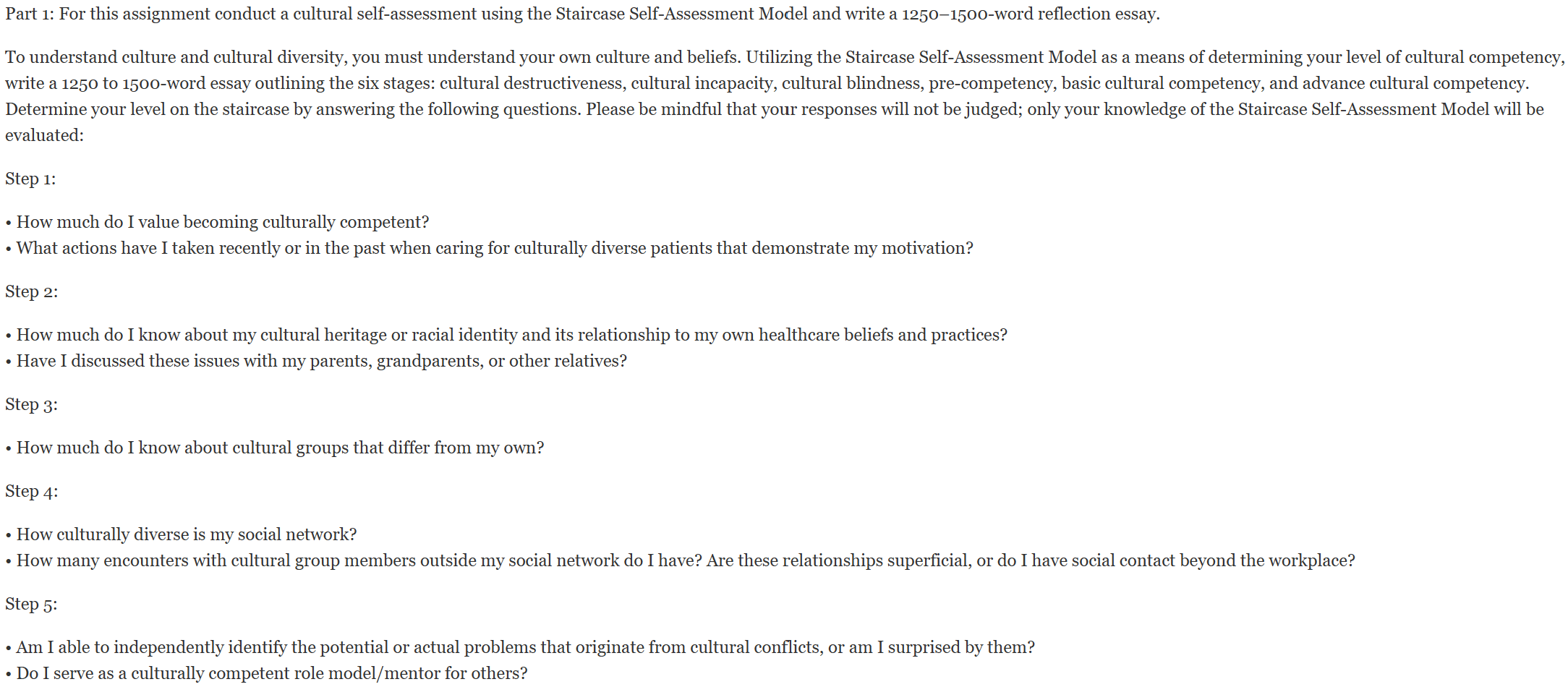For this assignment conduct a cultural self-assessment using the Staircase Self-Assessment Model and write a 1250–1500-word reflection essay
For this assignment conduct a cultural self-assessment using the Staircase Self-Assessment Model and write a 1250–1500-word reflection essay

Assignment Description:
Part 1: For this assignment conduct a cultural self-assessment using the Staircase Self-Assessment Model and write a 1250–1500-word reflection essay.
To understand culture and cultural diversity, you must understand your own culture and beliefs. Utilizing the Staircase Self-Assessment Model as a means of determining your level of cultural competency, write a 1250 to 1500-word essay outlining the six stages: cultural destructiveness, cultural incapacity, cultural blindness, pre-competency, basic cultural competency, and advance cultural competency. Determine your level on the staircase by answering the following questions. Please be mindful that your responses will not be judged; only your knowledge of the Staircase Self-Assessment Model will be evaluated:
Step 1:
• How much do I value becoming culturally competent?
• What actions have I taken recently or in the past when caring for culturally diverse patients that demonstrate my motivation?
Step 2:
• How much do I know about my cultural heritage or racial identity and its relationship to my own healthcare beliefs and practices?
• Have I discussed these issues with my parents, grandparents, or other relatives?
Step 3:
• How much do I know about cultural groups that differ from my own?
Step 4:
• How culturally diverse is my social network?
• How many encounters with cultural group members outside my social network do I have? Are these relationships superficial, or do I have social contact beyond the workplace?
Step 5:
• Am I able to independently identify the potential or actual problems that originate from cultural conflicts, or am I surprised by them?
• Do I serve as a culturally competent role model/mentor for others?
Step 6:
• Have I developed problem-solving strategies to manage cultural conflicts?
• Am I able to manage or resolve cultural problems or issues that arise, and what resources do I use?
Once you have completed the self-assessment, address the following questions:
1. Why are self-knowledge and understanding a critical step in achieving cultural competence?
2. How has the “cultural self-assessment” exercise influenced your awareness of personal and professional values, attitudes, and practices, including prejudices and biases?
3. How will your interactions with patients and families change as a result of this self-reflection?
Remember, you answer these questions from your perspective, so there is no right or wrong response. You must address each question. Although the information on your self-assessment paper is strictly confidential, if you do not wish to self-disclose a specific area from the Staircase, indicate that by explaining in detail why you do not want to disclose. You are not required to provide citations/references in this paper. Attention should be paid to grammar, spelling, and punctuation.
Part 2: Go to Think Cultural Health located on the U.S. Department of Health & Human Services Office of Minority Health website (you may access it from the following URL (https://thinkculturalhealth.hhs.gov/). Click on the Education tab. Select nurses and create your account (there are approximately seven questions to answer). Register for the Think Cultural Health program for nurses: Nurses – Culturally Competent Nursing Care: A Cornerstone of Caring.
For Module 1, you will only register and review the objectives of Course I. Throughout the next 7 Modules; you will complete the program. There are three (3) courses. The estimated time to complete the entire program is nine (9) hours.
When you register, please Do Not select the CNE Nursing option. You must select the option, Statement of Participation. You will submit the Statement of Participation in Module 7.
Verified Expert Answer
Cultural Self-assessment Using the Staircase Self-Assessment Model
Cultural diversity is a key factor for any medical professional and can be used to ensure efficient working relations. It is important that different interventions and models are applied to help improve the efficiency and outcome of care. The Staircase Self-Assessment Model can be used to help understand the aspect of cultural competency and how it can be applied within the healthcare sector. This paper will focus on the analysis of the Staircase Self-Assessment Model to explore the issue of cultural competency.
Stages of the Staircase Self-Assessment Model
Cultural Destructiveness
Cultural destructiveness occurs when a person denies patient healthcare services as of the difference in the culturally and linguistically diverse background. The aspect denotes that there can be challenges with the delivery of care when the nurse and patient come from different or diverse cultures, in this regard, the cultural difference would have facilitated the destruction of services that would have been rendered under other conditions.
Cultural Incapacity
The concept of cultural incapacity originates from the lack of capacity to meet the needs of patients from all ethnic, linguistic, and ethnic backgrounds. Incapacity is different from destructiveness since it focuses on the inability of the facility to meet different needs. The incapacity can be derived from the lack of resources or amenities to ensure that the facility meets all its services to different cultural different patients.
Cultural Blindness
The component of cultural blindness is the deliberate oversight of the aspect of culture and how it can be used to meet the different outcomes of care. When a care provider provides the same standard form of care to all patients regardless of their cultural background can be referred to as cultural blindness.
The aspect denotes that the treatment is only based on the medical need of the patient and not the alignment with cultural norms. Blindness treats each person equally and care is not based on cultural and ethnic needs, but rather based on standard protocols that apply to all.
Cultural Pre-Competency
The pre-competence aspect focuses on the strategies within which agencies or individual care providers attempt to improve their cultural awareness. The process is essential as it creates a means by which a person can further improve their understanding of culture and its impact on others. Cultural awareness within the pre-competence level can be viewed as the early stages toward proficiency.
Basic Cultural Competency
The stage of cultural competency is the continued attempts for a person to make cultural adjustments when interacting with a patient from diverse cultures other than their own. It is important for individuals in this stage to learn how to identify the differences and work on improving the general outcome. The strategies would help in increasing self-awareness and cultural understanding.
Advance Cultural Competency
Also called cultural proficiency, this stage is based on the overall ability of a person to respect and accept the different cultural and linguistic backgrounds of the patient. The person can easily and efficiently adapt to the values of the patient and meet their specific and individual needs.
Evaluation of Staircase Self-Assessment
Step 1:
- How much do I value becoming culturally competent?
I believe cultural competence is the basis for the future of nursing and needs to be adopted by all nurses. Cultural competency can improve the efficiency of the healthcare sector and bring about the desired changes and positive outcomes.
- What actions have I taken recently or in the past when caring for culturally diverse patients that demonstrate my motivation?
The main strategy I have taken when caring for culturally diverse patients is to first create a relationship during the assessment where I intentionally ask about their culture and preferences in terms of medical care and treatment.
Step 2:
- How much do I know about my cultural heritage or racial identity and its relationship to my own healthcare beliefs and practices?
I have a strong and in-depth understanding of my cultural heritage and racial identity. I am also conversant with how my culture affects my personal healthcare beliefs and practices.
- Have I discussed these issues with my parents, grandparents, or other relatives?
I am yet to have a detailed and candid discussion of the issues with my immediate or extended family but I occasionally ask various questions regarding complex issues that I need clarification on about the culture.
Step 3:
- How much do I know about cultural groups that differ from my own?
Despite having been in the healthcare industry for a while, there are way too many cultures and I cannot have an excellent understanding of all. However, I can rate myself as having above-average awareness of cultural groups that are different from my own.
Step 4:
- How culturally diverse is my social network?
My social network is diverse as I have friends and colleagues from different cultural, ethnic, social, and economic classes. I tend to freely interact with people regardless of their backgrounds and affiliation.
- How many encounters with cultural group members outside my social network do I have? Are these relationships superficial, or do I have social contact beyond the workplace?
I encounter different cultural group members outside my social network very often within my workplace and personal life. While the majority of the interaction is superficial, some of them proceed beyond the workplace to become friends and become part of my social network.
Step 5:
- Am I able to independently identify the potential or actual problems that originate from cultural conflicts, or am I surprised by them?
Through my competency in cultural differences, I can identify problems that can originate from cultural conflicts. While some of the problems are repetitive, some cultures can come as a surprise and require an additional assessment to learn and adjust.
- Do I serve as a culturally competent role model/mentor for others?
I am yet to be proficient in terms of cultural competence and while I can help others learn and improve their level of competence, I am yet to be a mentor. However, I hope to one day attain the level where I can be able to mentor and guide others.
Step 6:
- Have I developed problem-solving strategies to manage cultural conflicts?
At the beginning of my practice, I had challenges accepting and understanding the essence of cultural integration. However, I have become more aware of the need for understanding and accepting diversity.
- Am I able to manage or resolve cultural problems or issues that arise, and what resources do I use?
I am in a position to efficiently and easily resolve cultural problems that might arise. I believe that communication is a key resource and understanding the diverse needs of the patient through active listening and communication can help resolve the issue.
Critical Step in Achieving Cultural Competence
Self-knowledge and understanding are the basis of a person’s ability to know their strengths and weaknesses. Understanding what can trigger a person and how they respond to external stimuli can help in shaping the correct attitude and response to cultural differences and help improve on the weaknesses. Embracing the strengths and working on the weaknesses is a key strategy that can be used by an individual to achieve greater cultural competence and by extension, better patient outcomes
Impact of Cultural Self-Assessment
Engaging in cultural self-assessment has had a positive impact on my awareness of personal and professional values in different ways. I have been able to identify the areas of strength, and overall perception concerning the issues around cultural diversity. The role of the care provider can be impactful if they identify and understand how a patient’s culture can impact the overall outcome of care.
The self-assessment has also impacted my attitude towards patients from different cultures and practices as they relate to the delivery of care practices. I have also learned the importance of culture and the need to eliminate or mitigate issues of prejudice and cultures through cultural differentiations.
Interactions with Patients and Family
Following the self-reflection, I believe that I will have a different and more profound relationship with patients. I have had a chance to understand my cultural awareness and how it affects my delivery of care. The process helps provide a profound understanding of cultures and how different cultures can lead to different outcomes in care.
Place your order now for a similar assignment and get fast, cheap and best quality work written by our expert level assignment writers. Use Coupon Code: NEW30 to Get 30% OFF Your First Order
Use Coupon Code: NEW30 to Get 30% OFF Your First Order

FAQs:
What is the cultural competency staircase self-assessment model?
The Cultural Competency Staircase Self-Assessment Model is a framework used to evaluate and improve an individual’s or organization’s level of cultural competence. It consists of a series of steps or stages, each representing a different level of awareness, knowledge, and skills related to working effectively with diverse populations. The staircase typically includes stages such as cultural destructiveness, cultural incapacity, cultural blindness, cultural pre-competence, cultural competence, and cultural proficiency. By identifying their current stage on the staircase, individuals and organizations can develop strategies to advance toward greater cultural competence and improve their ability to provide equitable and inclusive services.
What is cultural self-assessment?
Cultural self-assessment is a process through which individuals or organizations evaluate their own cultural awareness, knowledge, and skills to better understand and address the needs of diverse populations. It involves reflecting on one’s biases, assumptions, and behaviors, as well as identifying areas for growth in cultural competence. Tools like the Cultural Competency Staircase Model or questionnaires are often used to guide this process. The goal of cultural self-assessment is to improve the ability to interact effectively and respectfully with people from different cultural backgrounds, ultimately promoting equity and inclusion in personal, professional, or organizational settings.
How to perform a cultural assessment in a healthcare setting?
To perform a cultural assessment in a healthcare setting, follow these steps:
- Build Trust: Establish rapport with the patient to create a safe and respectful environment.
- Ask Open-Ended Questions: Inquire about the patient’s cultural background, beliefs, values, and practices related to health and wellness.
- Assess Language Needs: Determine if the patient requires interpretation services or prefers communication in a specific language.
- Identify Health Beliefs: Understand the patient’s perspective on illness, treatment, and healing practices.
- Evaluate Social and Family Dynamics: Consider the role of family, community, and social support in the patient’s care.
- Document Findings: Record cultural insights to tailor care plans that respect the patient’s cultural preferences.
- Provide Culturally Competent Care: Use the assessment to deliver personalized, respectful, and effective healthcare services.

Dan Palmer is a dedicated academic writing specialist with extensive experience supporting nursing students throughout their educational journey. Understanding the unique challenges faced by nursing students who balance demanding clinical rotations, family responsibilities, and rigorous coursework, Dan provides professional assignment assistance that helps students maintain academic excellence without compromising their other commitments.
With a comprehensive understanding of nursing curriculum requirements and academic standards, Dan delivers high-quality, thoroughly researched assignments that serve as valuable learning resources. His expertise spans various nursing disciplines, including clinical practice, healthcare ethics, patient care management, and evidence-based research.
Dan’s approach combines meticulous attention to detail with a commitment to timely delivery, ensuring that busy nursing students receive the support they need when they need it most. His professional assistance has helped countless nursing students successfully navigate their academic programs while maintaining their professional and personal responsibilities.
Committed to academic integrity and excellence, Dan Palmer continues to be a trusted resource for nursing students seeking reliable, professional assignment support.
